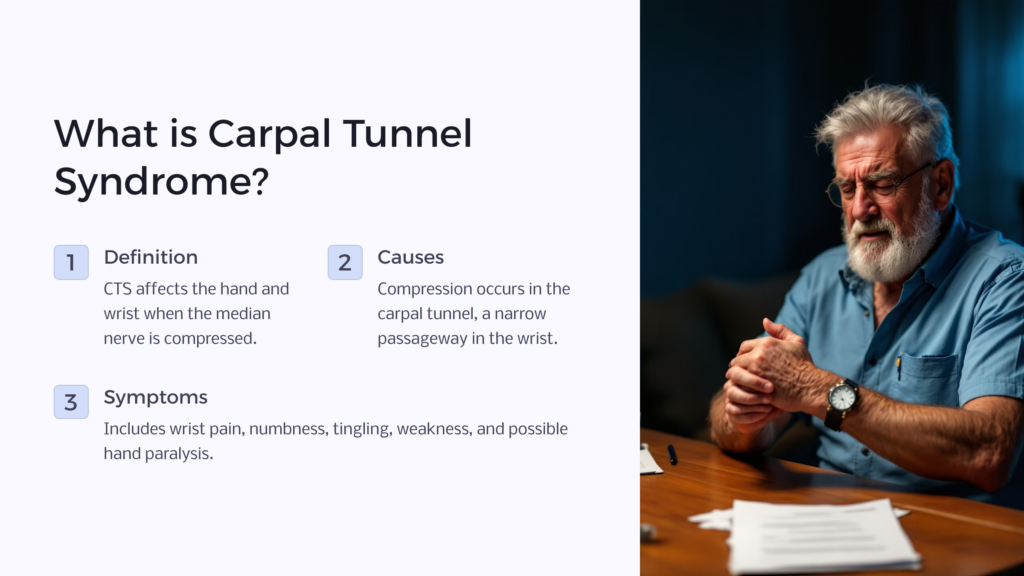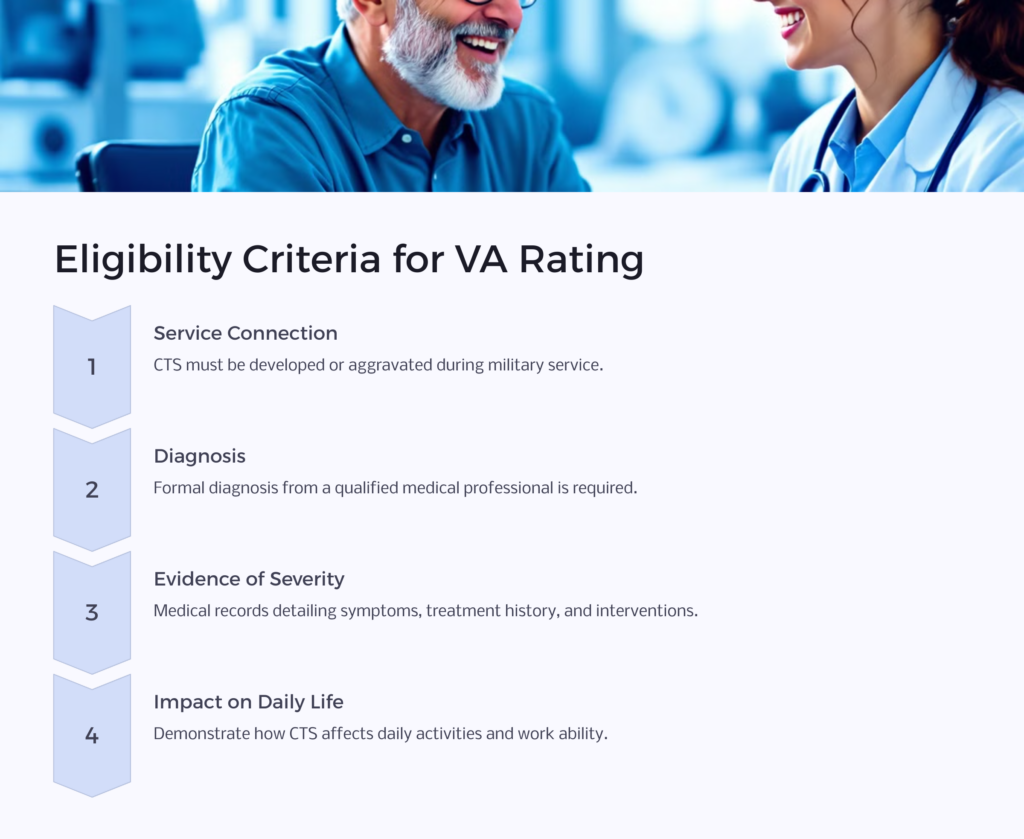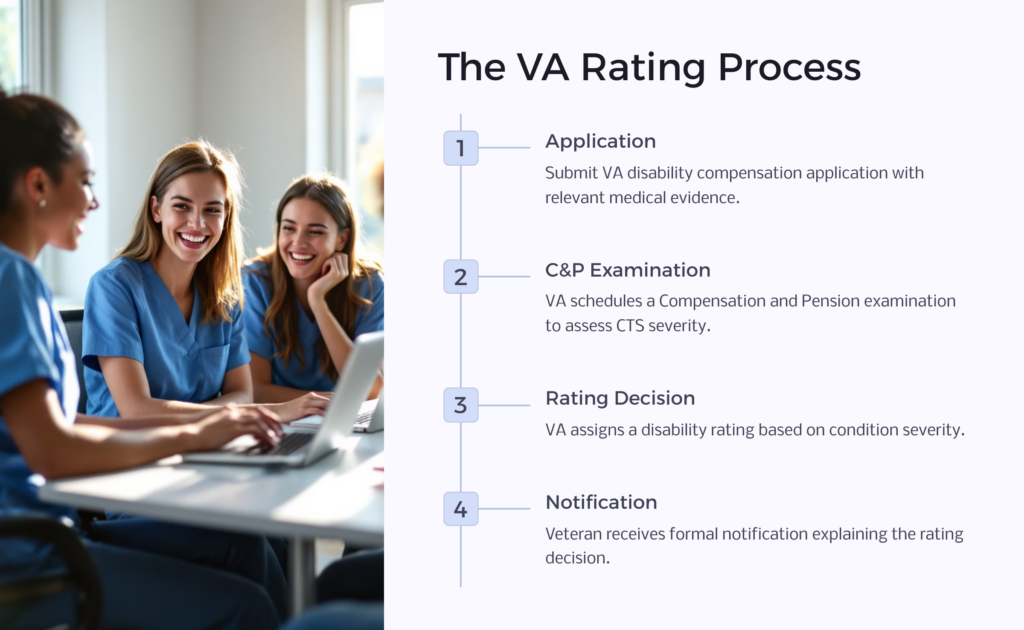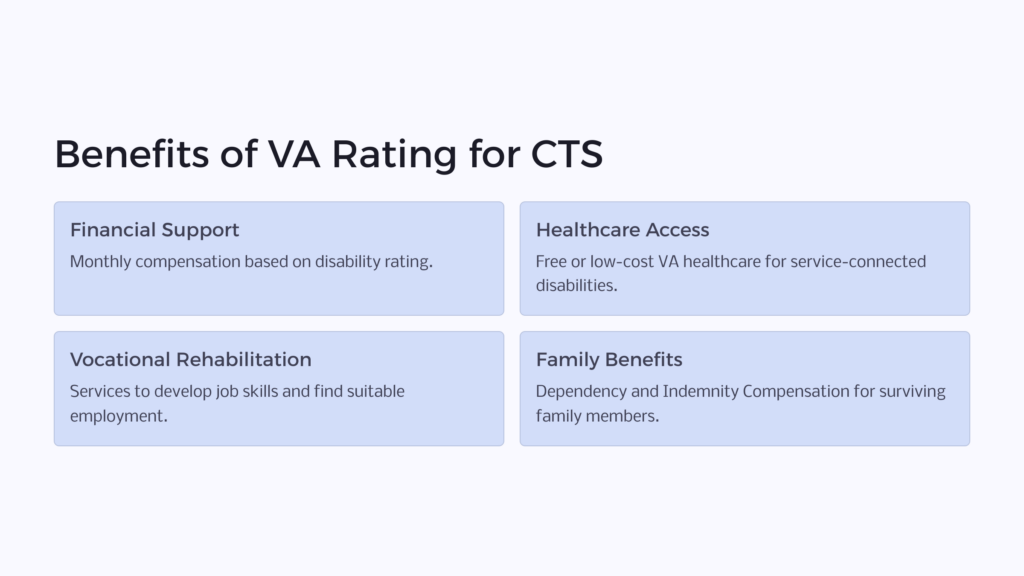Veterans who have served in the armed forces may experience a range of medical conditions and disabilities as a result of their service. Carpal Tunnel Syndrome (CTS) is one such condition that can affect veterans due to the physical demands of military service. To provide support to veterans with a service connected disability like CTS, the Department of Veterans Affairs (VA) disability compensation. In this article, we will delve into understanding VA ratings for Carpal Tunnel, including eligibility criteria and the VA disability rating process.
What is Carpal Tunnel Syndrome?

Carpal Tunnel Syndrome is a medical condition that affects the hand and wrist. It occurs when the median nerve, which runs through the wrist, becomes compressed or squeezed within the carpal tunnel, a narrow passageway of ligaments and bones. This compression can lead to nerve damage and a range of symptoms including wrist pain, numbness, tingling, weakness, or even complete paralysis in the affected hand.
Eligibility Criteria for VA Rating

To be eligible for a VA disability rating for Carpal Tunnel Syndrome, veterans must meet certain criteria:
- Service Connection: The first and most crucial criterion is that the CTS must count as a service connected disability, meaning it must have developed or been aggravated during military service. Veterans must provide medical evidence to establish this connection.
- b. Diagnosis: A formal diagnosis of Carpal Tunnel Syndrome from a qualified medical professional is essential. Medical records and reports from a healthcare provider should clearly state the diagnosis.
- c. Evidence of Severity: Veterans seeking a VA rating for CTS should provide evidence of the severity of their condition. Mild Carpal Tunnel syndrome may not warrant a high VA disability rating. This may include medical records detailing the extent of their symptoms, treatment history, and whether any Carpal Tunnel surgery or physical therapy was done.
- d. Impact on Daily Life: It’s essential to demonstrate how Carpal Tunnel symptoms affect your daily life and ability to work. Compromised finger and wrist movements can make certain tasks difficult. Try to note where your Carpal Tunnel symptoms interfere with your life. This can include statements from employers, vocational rehabilitation specialists, or personal testimonies.
The VA Rating Process:

The VA rating process involves several steps to determine the level of disability compensation that veterans are entitled to for their condition, in this case, Carpal Tunnel Syndrome:
a. Application: Veterans must submit an application for VA disability compensation. It’s crucial to provide all relevant medical evidence including diagnosis, treatment records, and evidence of service connection.
b. Compensation and Pension (C&P) Examination: In most cases, the VA will schedule a physical examination called a Compensation and Pension (C&P) examination for the veteran. During this examination, a VA healthcare provider will assess the severity of the Carpal Tunnel Syndrome and its impact on the veteran’s daily life.
c. Rating Decision: After reviewing all the evidence, the VA will make a rating decision. This decision will include the assigned disability rating, which is a percentage that reflects the severity of the condition. The higher the rating, the more compensation a veteran will receive.
d. Notification: Veterans will receive a formal notification letter from the VA that outlines the rating decision and explains how the rating was determined.
e. Appeal Process: If a veteran disagrees with the VA’s rating decision, they have the right to appeal. The appeal process can involve submitting additional evidence, attending hearings, or seeking legal assistance.
Common Questions about Carpal Tunnel and VA Ratings:
- What is Carpal Tunnel Syndrome (CTS)? Carpal Tunnel Syndrome is a medical condition that occurs when the median nerve, which runs from the forearm into the hand, becomes compressed at the wrist. This compression, or pinched nerve, can lead to hand and wrist pain, numbness, and weakness in the hand and arm.
- What are common Carpal Tunnel treatment options? There are a few treatment options a medical professional can offer, including the use of a wrist splint, physical therapy, a corticosteroid injection, and, in more severe cases, Carpal Tunnel release surgery.
- Can veterans receive VA disability benefits for Carpal Tunnel Syndrome? Yes, veterans can receive VA disability benefits for Carpal Tunnel Syndrome if it is related to their military service. To qualify for VA benefits, veterans must demonstrate that their CTS is connected to their time in service, often through medical records and expert opinions.
- How are VA disability ratings determined for Carpal Tunnel Syndrome? The VA uses a rating system to assess the severity of disabilities. For Carpal Tunnel Syndrome, ratings are typically based on the range of motion and functional limitations caused by the condition. Ratings can range from 0% to 100%, with higher ratings indicating greater disability.
Available Social Security Disability Benefits

There are many reasons why applying for a VA Rating can be beneficial to you, so here are some reasons we think it is worth getting a rating:
- Financial Support: One of the primary benefits of a VA rating for Carpal Tunnel Syndrome is the financial support it provides. Veterans with higher disability ratings receive higher monthly compensation payments, which can help cover medical expenses and daily living costs, and provide financial stability.
- Access to Healthcare: Veterans with service-connected disabilities, including Carpal Tunnel Syndrome, are eligible for free or low-cost healthcare through the VA healthcare system. This essential disability benefit ensures they receive necessary medical treatment and access to specialists.
- Vocational Rehabilitation: The VA offers vocational rehabilitation and employment services to veterans with service connected disabilities. These programs can help veterans develop new job skills, find suitable employment, and transition into civilian careers.
- Dependency and Indemnity Compensation (DIC): In the unfortunate event that a veteran passes away due to a service connected disability, their surviving spouse and dependents may be eligible for Dependency and Indemnity Compensation (DIC), which provides financial support to the family.
Appealing a VA Rating Decision:
Appealing a VA Rating decision can seem like a daunting task or maybe it is something you didn’t know you could do. Below we have put together a step-by-step list of how you can appeal for a VA Rating.
- Understand the Decision If you receive a VA rating decision that you believe is incorrect or inadequate, the first step is to carefully review the decision letter. Pay close attention to the reasoning behind the rating and the evidence used to support it.
- Consult with an Attorney or VSO Consider seeking assistance from a qualified attorney or Veterans Service Organization (VSO). These professionals are experienced in making claims and can provide valuable guidance throughout the appeals process.
- Gather Additional Evidence If you believe the VA rating decision is incorrect, gather additional medical records, expert opinions, or other evidence that supports your VA disability claim. This can help strengthen your case during the appeals process.
- Initiate the Appeals Process The appeals process typically begins by filing a Notice of Disagreement (NOD) with the VA. This document informs the VA of your disagreement with their decision and initiates the appeals process.
- Attend a VA Hearing In some cases, veterans may have the opportunity to attend a VA hearing with a Decision Review Officer (DRO) to discuss their case and provide additional evidence. This can be a crucial step in building a successful appeal.
- Continue the Appeals Process If the NOD and hearing do not lead to a favorable outcome, you can continue the appeals process by pursuing a decision from the Board of Veterans’ Appeals (BVA). This involves submitting additional evidence and arguments to the BVA for review.
Let Us Help You
Understanding the VA’s process of rating disabilities is essential for veterans seeking VA benefits and support for their conditions. Social Security disability benefits can provide financial assistance, access to healthcare, vocational rehabilitation, and other valuable benefits. If you receive a VA rating decision that you believe is incorrect, don’t hesitate to appeal the decision with the help of professionals who specialize in making this kind of VA disability claim. By going through the appeals process effectively, veterans can ensure they receive the benefits and support they deserve. If you have more questions about receiving a Carpal Tunnel VA rating, contact us today at Benefits.com.
 Benefits.com Advisors
Benefits.com Advisors
With expertise spanning local, state, and federal benefit programs, our team is dedicated to guiding individuals towards the perfect program tailored to their unique circumstances.
Rise to the top with Peak Benefits!
Join our Peak Benefits Newsletter for the latest news, resources, and offers on all things government benefits.


















